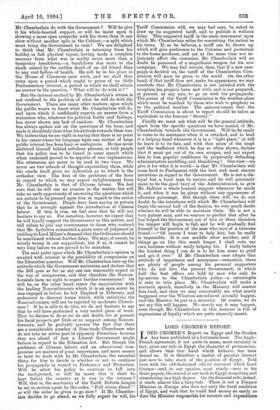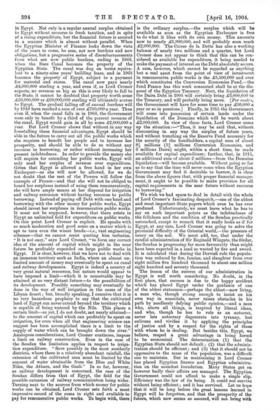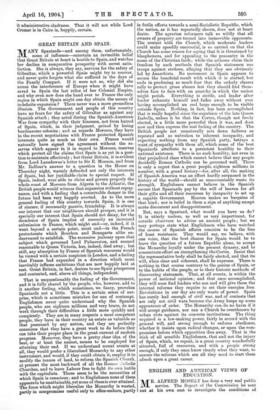in Egypt. Not only is a regular annual surplus obtained
in Egypt without recourse to fresh taxation, and in spite of a rising expenditure, but the financial future is assured in a manner which is almost without parallel. When the Egyptian Minister of Finance looks down the vista of the years to come, he sees, not new burdens and new obligations, but a progressive series of disembarrassments from what are now public burdens, ending in 1968, when the Suez Canal becomes the property of the Egyptian State. The canal was dug on terms equiva- lent to a ninety-nine years' building lease, and in 1968 becomes the property of Egypt, subject to a payment for material and stores. The canal now pays nearly £4,000,000 sterling a year, and even if, as Lord Cromer expects, no revenue so big as this is ever likely to fall to the State, it cannot be doubted that property worth some £50,000,000 or £60,000,000 sterling will ultimately accrue to Egypt. The gradual falling off of annual burdens will by 1948 have reached a sum of over £700,000 a year. Thus even if, when the canal falls in in 1968, the Government were only to benefit by a third of the present revenue of the canal, Egypt would gain in all by some £2,000,000 a year. But Lord Cromer shows that without in any way forestalling these financial advantages, Egypt should be able in the future to carry out all the public works which she requires to benefit her people and to increase her prosperity, and should be able to do so without any recourse to borrowing, or rather without increasing her present indebtedness. In order to provide the money she will require for extending her public works, Egypt will only need her surplus of revenue over expenditure. Given that Egypt is allowed a free hand in her own Exchequer—as she will now be allowed, for we do not doubt that the rest of the Powers will follow the example of France—and that she will not be obliged to hoard her surpluses instead of using them remuneratively, she will have ample means at her disposal for irrigation and railway extension without having recourse to public borrowing. Instead of paying off Debt with one hand and borrowing with the other money for public works, Egypt should invest her surpluses in remunerative public works. It must not be supposed, however, that there exists in Egypt an unlimited field for expenditure on public works. On this point Lord Cromer is explicit. He speaks with so much moderation and good sense on a matter which is apt to turn even the wisest heads—i.e., vast engineering schemes—that we cannot resist quoting him verbatim. "It is not easy," says Lord Cromer, "to form any correct idea of the amount of capital which might in the near future be profitably expended on large public works in Egypt. It is clear, however, that we have not to deal with an immense territory such as India, where an almost un- limited amount of money may eventually be spent on canal and railway developments. Egypt is indeed a country of very great natural resources, but nature would appear to have imposed a limit—which it is conceivable may be attained at no very distant future—to the possibilities of its development. Possibly something may eventually be done in the way of well irrigation in the oases of the Libyan desert ; but, broadly speaking, I conceive that it is no very hazardous prophecy to say that the cultivated land of Egypt can never extend beyond the territory which is capable of being watered by the Nile. This places a certain limit—as yet, I do not doubt, not nearly attained— to the amount of capital which can profitably be spent on irrigation, for even when all that engineering science can suggest has been accomplished there is a limit to the supply of water which can be brought down the river." Analogous considerations, Lord Cromer continues, impose a limit on railway construction. Even in the case of the Soudan the limitation applies in respect to irriga- tion expenditure. "Save possibly in the most southerly districts, where there is a relatively abundant rainfall, the extension of the cultivated area must be limited by the amount of water obtainable from the Blue and White Niles, the Atbara, and the Gash." In so far, however, as railway development is concerned, the case of the Soudan differs from that of Egypt, the field for the possible extension of railway communication being wider. Turning next to the sources from which money for public works can be obtained, Lord Cromer sets forth a most impressive record of the sums in sight and available to pay for remunerative public works. To begin with, there
to do what it likes with its own money. This amounts now to nearly £1,900,000, and will probably soon reach £2,000,000. The Caisse de la Dette has also a working balance of nearly two millions and a quarter, but Lord Cromer does not appear to think that this can be con- sidered as available for expenditure, it being needed to make the payment of interest on the Debt absolutely secure. A sum, however, which cannot be regarded as anything but a real asset from the point of view of investment
in remunerative public works is the £5,500,000 and over which constitutes the Conversion Economies Fund,—the' fund France has this week consented shall be at the dis- posal of the Egyptian Treasury. Next, the liquidation of the Daira Debt in 1905 will certainly bring £3,000,000 to the Treasury, and will probably bring more. [Per contra, the Government will have for some time to pay £50,000 a year or so in pensions.] Finally, in 1915 the Government will come into possession of certain lands under the liquidation of the Domains which will be worth about £2,000,000. In view of these facts, Lord Cromer sums up the situation :—"Thus, it may be said that, without discounting in any way the surplus of future years, and without trenching on the Reserve Fund necessary for the security of the bondholders, a capital sum of about 81. millions (N. millions Conversion Economies, and 3 millions Daira) might, within a short time, be made available for capital expenditure ; further, that, in 1915, an additional sum of about 2 millions—from the Domains liquidation—will become available. Without going so far as to say that the time will never come when the Egyptian Government may find it desirable to borrow, it is clear from the above figures that, with proper financial manage- ment, it ought to be possible to make provision for all c.apital requirements in the near future without recourse to borrowing."
We wish we had space to deal in detail with the whole of Lord Cromer's fascinating despatch,—one of the ablest and most important State papers which even be has ever produced. Unfortunately, we must leave what he has to say on such important points as the indebtedness of the fellaheen and the condition of the Soudan practically untouched, except to remark that it really looks as if for Egypt, at any rate, Lord Cromer was going to solve the perennial difficulty of the Oriental world,—the pressure of usury on the soil. We must add, too, that under the careful administration of Sir Reginald Wingate, the Sirdar, the Soudan is progressing far more favourably than might have been expected in a land so wasted by fire and sword. It is calculated that during the Dervish rule the popula- tion was reduced by fire, famine, and slaughter from over eight million five hundred thousand to about one million eight hundred and seventy thousand.
The lesson of the success of our administration in Egypt is well worth considering. No doubt, in the first place, that success is due to the happy accident which has placed Egypt under the guidance of one of the ablest statesmen—perhaps the ablest—now living, a man who, though strong enough to insist on his own way in essentials, never raises obstacles in his path by needlessly defying public opinion,—and a man who, above all things, is inspired by liberal ideas, and who, though he has to rule as an autocrat, never lets autocracy degenerate into tyranny, but enlivens and vivifies it by applying the principles of justice and by a respect for the rights of those with whom he is dealing. But besides this, Egypt, we believe, reaped a great advantage in being forced to be economical. The determination (1) that the Egyptian State should not default ; (2) that the adminis- tration should be efficient ; and (3) that it should not be oppressive to the mass of the population, was a difficult one to maintain. But in maintaining it Lord Cromer has placed Egyptian finance and Egyptian administra- tion on the soundest foundation. Many States get on however badly their affairs are managed. The Egyptian Government could not afford to make a single slip. Efficiency was the law of its being. It could not survive without being efficient ; and it has survived. Let us hope that it will be long before the great lessons learned in Egypt will be forgotten, and that the prosperity of the future, which now seems so assured, will not bring with
it administrative slackness. That it will not while Lord Cromer is in Cairo is, happily, certain.








































 Previous page
Previous page